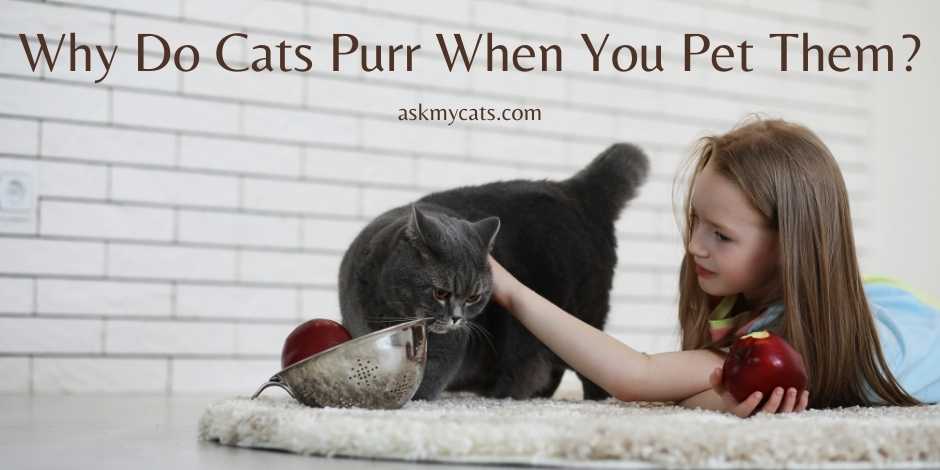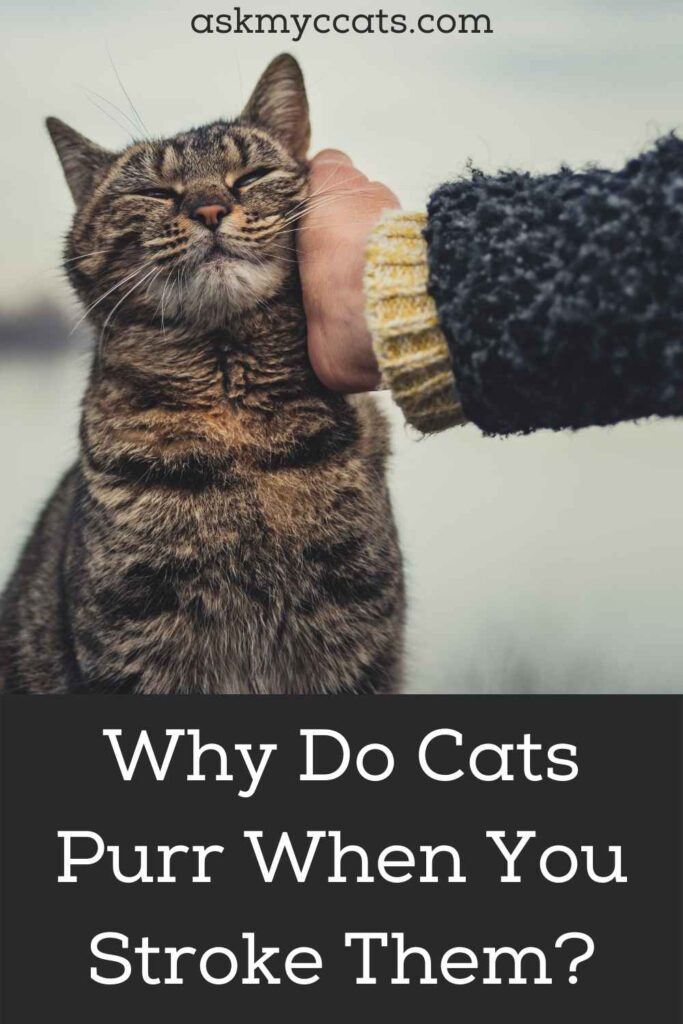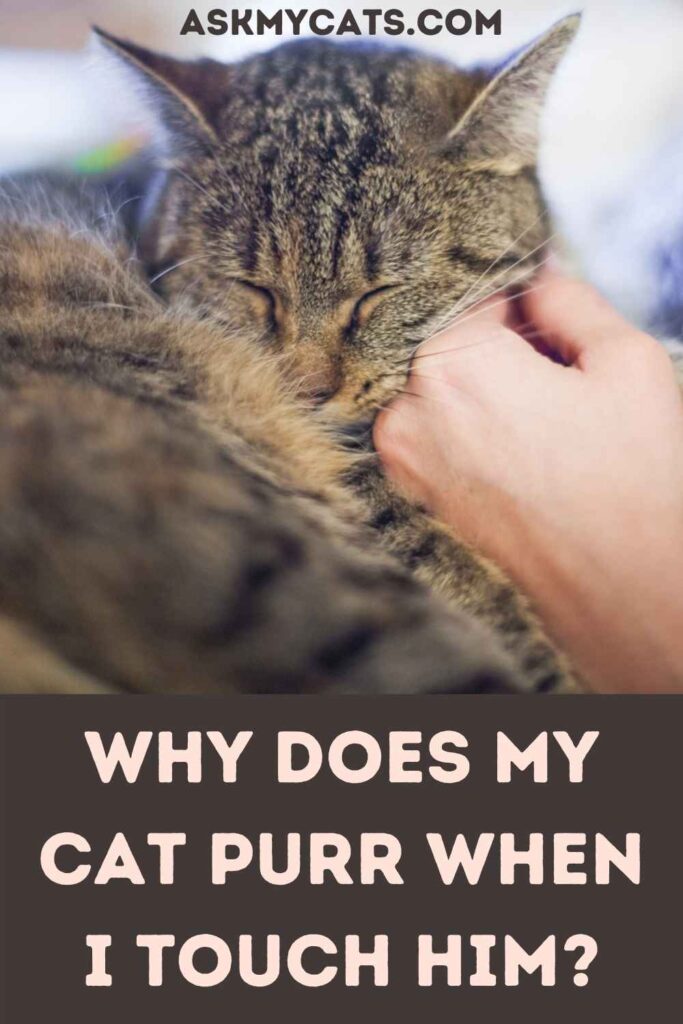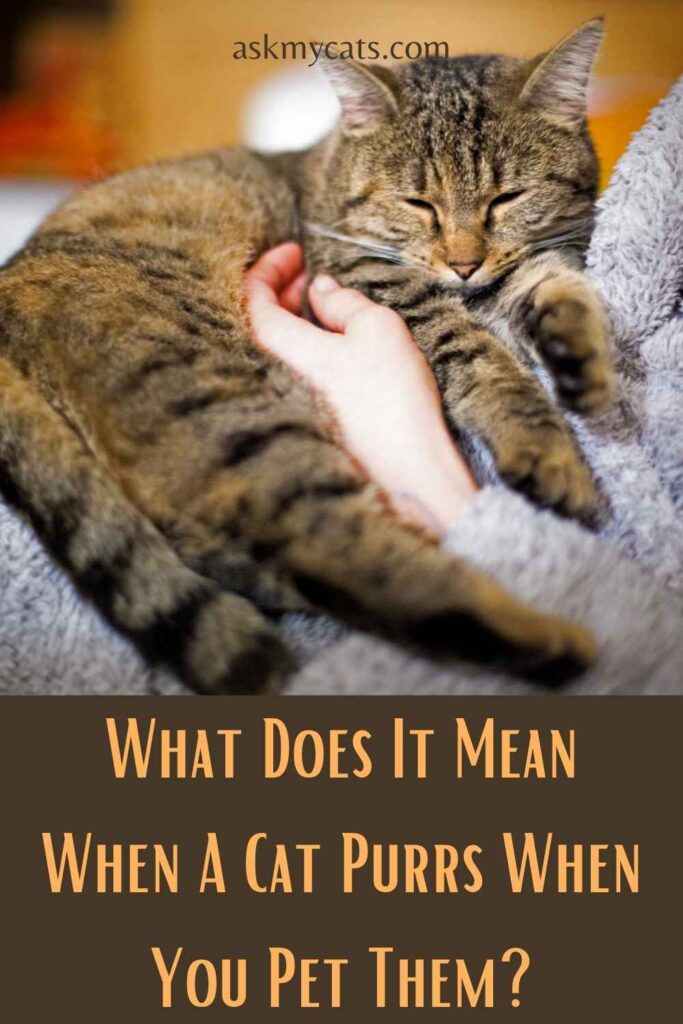Cats don’t have the same level of facial expression as dogs, are typically quieter, and their actions might be more difficult to decipher—but that doesn’t make the feline mystique impenetrable.
Pay attention to your pet’s vocalizations, body postures, and daily activities to gain a deeper understanding of them.
When cats are in a peaceful atmosphere, they will purr, sending off waves of tranquility. This can also happen when you pet them, indicating that your feline companion is pleased or friendly. Cats, on the other hand, purr to express a variety of emotions and wants.
You may grow so sensitive to your kitty’s personality and habits over time that you’re able to detect minor mood shifts and even spot health issues before they manifest physically.
Key Takeaways
- Cats purr for a variety of reasons, including when they are happy, relaxed, or content.
- A cat may also purr when it is sick or in distress, using the purring to comfort itself.
- Cats may also purr when they are interacting with their siblings or with humans or objects they enjoy.
- Purring is a form of communication that indicates that a cat is feeling comfortable or happy.


Give Your Cat the Perfect Day
Get the Free Ebook!
Why Do Cats Purr When You Pet/Stroke Them?
Cats purr when you give a stroke to them because purring is typically associated with satisfaction. When cats are happy, they purr, even when they are eating.
However, like a kid sucking their thumb, a cat may purr when they’re frightened or unwell, utilizing their purr to comfort themselves.
When cats are in a peaceful atmosphere, they will purr, sending off waves of tranquility. This can also happen when you brush them, indicating that your feline companion is pleased or friendly.
Cats, on the other hand, purr to express a variety of emotions and wants. If you pick up your cat, for example, they will purr either because they enjoy it or because they are scared.
“Purring is a sign of contentment, and it is often associated with being petted and groomed.
Cats will also purr when they are being held or cuddled, or when they are nursing their young. Purring is a way for cats to communicate their feelings and to bond with their owners.”
Dr. Katie Grzyb, veterinarian at the ASPCA
While you’ll never know precisely what your pet is attempting to communicate with a purr, you may make an educated estimate based on the circumstances.
Cats purr for a variety of causes. Understanding the body language involved with purring might assist guarantee that your furball continues to enjoy the synergy of being stroked.
Although it is common knowledge that purring indicates that your cat is comfortable, this does not always imply that they are in a happy mood. Our felines purr for a variety of reasons, including pleasure or pain.
We’ll never know what your cat is saying, but let’s look at some of the reasons why our felines purr when you brush them.

1. In a Happy Mood
Cats purr when they are calm most of the time. This generally occurs when you brush them, and in this situation, it indicates that they are pleased or friendly.
It’s fair to believe your cat is in a good mood if its eyes are half-closed, they’re on its back, and its tail is mostly motionless.
Adult cats purr when they interact with their siblings, as well as with people or items they adore. Another cause for this display of happiness is when they are doing something pleasurable, such as caressing or petting.
When you stroke her, when she curls up on your chest, or just before she falls asleep in her favorite bed, you could hear her purring.
Our domestic cats have sweet spots where they really like being caressed and handled. These are some of them:
Between the ears, along the cheeks, down the spine (avoid overstimulation), and under the chin are all good places to start.
If your cat purrs while being caressed and handled in these places, we may assume it is comfortable and happy.
2. For Kitten-Mother Connection
Kittens are born deaf and blind, and they communicate with their mothers through sensing vibrations. They begin purring when they are just a few days old to establish touch with their mother and create a relationship.
These lovely tiny bundles purr to let their mom cats know they’re safe and sound.
Mother cats use purring to entice their kittens closer to keep them warm and safe, or when it’s mealtime because kittens can’t orient themselves. Their gentle noises can also be used as cradle songs for their kittens.
3. Signs of Distress
Purring does not necessarily imply that your cat is a joyful ball of fluff rolling around on its back, sending subtle rasp vibrations out for your attention. When a cat is disturbed or nervous, he or she purrs.
They may be anxious as a result of unexpected changes in their home, such as the addition of a new pet, a new human family member, or even home remodeling.
They also produce similar sounds when they are scared or in need of assistance. Purrs can assist your cat to relax during a stressful situation, such as giving birth.
Purring’s low-frequency vibrations can help you relax and breathe more easily — how cool is that?
Interesting Read: Do Cats Purr When They Are Sick Or In Pain?
4. Purr Healing Powers
Our felines can purr when they are extremely ill, wounded, or in pain, in addition to when they are anxious. Purring produces endorphins, which can help relieve pain and repair injuries in our affectionate felines. Purr has a strong healing and revitalizing effect.
Without being stroked, cats will often purr on their own. When your cat purrs contentedly while napping off, it’s possible that they’re self-repairing.
Purrs have the power to make your cat feel better, promote healing, and relieve pain.
Purrs are shown to vibrate at low frequencies between 25 and 150 hertz, according to research. These frequencies can be used to cure a variety of illnesses by acting as a natural healing process.
- Healing of the bones and wounds
- Muscle and tendon discomfort can be relieved.
- Breathe easily.
- Muscle development
- Assistance with joint flexibility
- Assist in muscle development
- Assist in reducing edema
Stop stroking your pet if you think he or she is in pain or has an injury, and look for symptoms of discomfort, such as hunching over or limping.
They can have issues as a result of high falls, but their purring is probably what helps them heal so quickly.
“The physical contact of petting a purring cat has been shown to have a number of positive effects on human health and well-being, including reducing pain and discomfort, improving sleep, and boosting immune system function.
Petting a purring cat can also release oxytocin in the human brain, which can further enhance feelings of relaxation and well-being.”
Dr. Elizabeth von Muggenthaler, bioacoustics specialist
Interesting Read: Why Do Cats Purr While Eating?
5. Overstimulated
Because they are overstimulated, our felines may purr when you brush them. Keep an eye out for abrasive, loud purring, biting, and other aggressive behaviors.
Cats are sensitive to the touch, and your frequent petting might cause them to become overstimulated. They may accept your petting, but it’s better to leave them when their purring gets agitated and loud.
Take a look at these indications that your cat is overstimulated:
- The tail is pounding or swishing
- Ears that have been lowered or flattened
- Snarling or hissing
- Attempting to flee
- The muscles of the body are tight.
- The pupils in her eyes are dilated.
- While you’re caressing her, she’s squirming.
- Claws protrude from the body.
- Displaying various forms of aggression
Interesting Read: Why Does My Cat Purr And Bite Me?
6. Purry Kitty
Purring can help cats in a variety of ways. A ‘solicitation purr’ (coupled with a cry or meow) aids your adoring feline in obtaining what they desire from their human – food, attention, or the opportunity to play with a toy.
It’s no coincidence that your cat purrs around you, becoming more passionate around mealtimes. When our feline companions are hungry or obtain what they want, they use their beautiful noises to their advantage.
These noises are combined with a ‘mew’ that sounds like a wailing infant — incredibly dramatic.
Stop petting your purr-meowing kitten and watch her movements if you believe she’s hungry.
Must Read: Cat Purring Effect On Humans: The Power of Cat Purring
Why Does My Cat Purr When I Touch Him?
Cats purr when you touch them because they like your touch and want you to rub your hands on their fur to comfort them.

A joyful mood — if your cat appears calm, with half-closed eyelids and a mostly motionless tail, it’s fair to believe they’re purring because they’re pleased.
Food on their minds – Cats purr when they’re hungry and it’s time to eat. They mix their usual purr with a “mew” while begging for food.
Kitten-Mother Bond — Kittens may purr as early as a few days old, and it is a method for them to communicate with their moms and let them know where they are.
Purring also aids in the bonding of a kitten and its mother, and mother cats purr as a lullaby.
Many cats purr when they are wounded or in agony. Purring is a cat’s technique of calming down; similar to how a human child may suck their thumb to feel better.
Purring is said to speed up the healing process in cats. Low-frequency purrs generate vibrations in the body that help to mend bones and wounds, grow and repair tendons, improve breathing, and reduce discomfort and swelling.
This might explain why cats are more able to withstand large falls and have fewer surgical problems than dogs.
Whatever the cause for your feline friend’s purr, it’s a sound that many cat parents appreciate. The purr is a feline lullaby that relaxes both the performer and the listener.
Purring cats produce vibrations ranging from 20 to 140 Hz for a number of causes. One of the best things about a cat’s purr is that it may be both a show of affection and a health benefit.
Purring is a kind of “healing power” that might help you relax and reduce your blood pressure. So give your cat a pet or a scratch on the head or under his chin whenever you can to get him purring!
Interesting Read: Why Does My Cat Lay On Me And Purr?
Why Does My Cat Purr So Loud When I Pet Him?
Some cats purr louder than others by nature. Your cat may be particularly delighted if she purrs louder than normal. With age, a cat’s purr may get louder. The pitch and loudness of a cat’s purr can be affected by a variety of factors, including respiratory problems.
Adult cats frequently utilize trilling to convey affection and contentment. You could notice that your cat trills to signal that they want to be petted.
Trilling may be a method for your cat to get your attention as well as a gesture of affection.
What Does It Mean When A Cat Purrs When You Pet Them?
Purrs produce feel-good endorphins, therefore scientists believe cats utilize vibrations to relax. That may mean your cat purring as you give them some warm hugs, or it could mean it’s calming their nerves—or even healing their suffering.

From the time they are kittens, cats begin purring and hearing purring. Mother cats purr to attract their blind and deaf kittens to them for food and warmth when they are born.
Kittens purr to signal they’re OK and to help them bond with their mom cat, according to veterinarians. Purrs are utilized for anything from conveying delight and happiness to alleviating pain as cats get older.
Furthermore, whole-body vibrations of 35 to 50 Hz have been proven to assist accelerate bone repair in investigations.
The purr frequencies of cats range from 25 to 150 Hz, and some researchers believe the vibrations may help kittens maintain a healthy skeleton.
It may seem strange, but NASA astronauts have utilized vibration treatment in space, where there is no gravity and no weight-bearing exercise. Although you may not be able to educate your cat to purr on order, you may teach it to do other things.
Interesting Read: Why Does My Cat Drool When He Purrs?
The Benefits of Petting a Purring Cat
| Benefit | Explanation |
|---|---|
| Reduces stress and anxiety | Petting a purring cat can have a soothing, calming effect on humans, helping to reduce stress and anxiety levels. |
| Improves sleep | The rhythmic vibrations of cat purring can help to relax the body and mind, making it easier to fall asleep. |
| Eases pain and discomfort | The physical contact of petting a purring cat has been shown to have pain-relieving effects, which can help to ease discomfort and improve overall well-being. |
| Boosts immune system function | Cat purring may help to boost immune system function, which can help to protect against illness and disease. |
| Promotes healing and recovery | The vibrations of cat purring may help to stimulate blood flow, which can aid in the healing process and promote recovery. |
| Increases oxytocin levels | The physical contact of petting a purring cat can also release oxytocin in the human brain, which can further enhance feelings of relaxation and well-being. |
Some of the Interesting reads regarding cat purring:
- Why Do Cats Purr? The Science of Cat Purring
- Why Doesn’t My Cat Purr?
- How To Make A Cat Purr?
- Why Do Cats Purr When They Are Dying?
- Do Cats Purr When They Sleep?
- Why Does My Cat’s Purring Sound Congested?
- Why Does My Cat Purr When He Sees Me?
- Why Is My Cat Purring So Much?
- Why Does My Cat Purr So Loudly?
- Can Cats Control Their Purring?
- Do Cats Purr When They Are Happy?
- Do Cats Breathe Faster When Purring?
- Why Do Cats Purr When You Talk To Them?
- Differences In Purring Between Cat Breeds
- Why Do Cats Wag Their Tails While Purring?
- How To Purr Like A Cat?
- Why Do Cat’s Noses Get Wet When They Purr?
- Why Is My Pregnant Cat Purring So Much?
- Why Do Cats Purr And Knead?
- Do Feral Cats Purr?
Frequently Asked Questions
Why does my cat purr when I rub him?
Purrs produce feel-good endorphins, therefore scientists believe cats utilize vibrations to relax. That may mean your cat purring as you give them some warm hugs, or it could mean it’s calming their nerves—or even healing their suffering.
Why does my cat make a sound when I touch her?
She likes you, and the sound you’re hearing is called a ‘trill.’ Cats acquire this sound as kittens from their mother, who uses it to catch their attention so they will follow her; cats see trills as a positive sign. Cats produce the ‘trill’ sound to greet other cats or people as adults. Consider it a ‘Hello!’
Is purring a sign of affection?
One of the best things about a cat’s purr is that it may be both a show of affection and a health benefit. Purring is a kind of “healing power” that might help you relax and reduce your blood pressure.
Final Words
Purring while you pet them is one of the most compelling signals that your cat loves you. Your cat, being a natural predator, dislikes feeling exposed, and is especially afraid of feeling vulnerable while sleeping.
She’s revealing herself at her most vulnerable and demonstrating her faith in you by sleeping on you.
Feel free to drop your questions in the comments section below!
Interesting Read: Why Does My Cat Purr While Playing?
